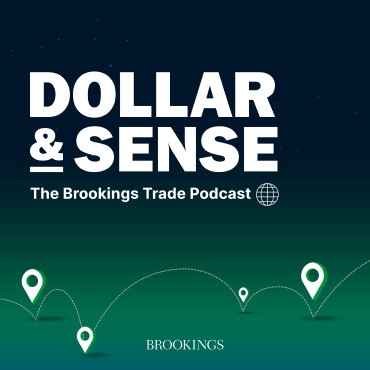Michael Spence is a Nobel Prize-winning economist, leading expert in Industry 4.0, and someone with the opportunity to advise the Chinese government. He joins this episode of Dollar & Sense to discuss global technology competition and how emerging technologies will affect the future of economic development.
Related content:
What My Younger Self Never Expected
Florida as a Developing Country
China 2049: Economic Challenges of a Rising Global Power
DAVID DOLLAR: Hi, I’m David Dollar, host of the Brookings trade podcast Dollar & Sense. Today, my guest is Nobel Prize-winning economist Mike Spence who is leading expert on economic growth, particularly the roles of technological innovation and international trade. He’s also someone that the Chinese leadership listens to, so we’ll get into China as well. Welcome to the show, Mike.
MICHAEL SPENCE: Thank you, David. I was thinking for this episode you could call it “Dollar and Spence.”
DOLLAR: Oh, I like that! Maybe we’ll use that title.
SPENCE: I’m just kidding. But anyway, nice title, and great to see you again.
DOLLAR: Thank you. So the background for our talk is that the world is undergoing an industrial revolution sometimes referred to as Industry 4.0. There’s a lot of anxiety in the United States that the U.S. is falling behind other countries in technology competition. Let’s start with the features of Industry 4.0. What are some of the key technologies that are going to enable this?
SPENCE: Well, I think at the top of the list is a collection of digital technologies. The core of it— somewhere in that core—is data, and who controls the data, and how do they get to use it. Then you have a lot of things that go along with it in multiple dimensions that give people headaches. You know, national security, how does a democracy function, impact on kids, impact on jobs. It goes on and on and we have to wrestle with all these things.
I think at the core of it, a group of people who think deeply about this—both from the industrial side and from our side (academics or policy)—we don’t really have a set of models that are fit for purpose for sort of dealing with this. So, we’re struggling. I’m not saying we have to throw out all our models, but we have a world in which valuation is essentially shifted almost entirely to intangible assets. And when you dig underneath that, it’s intellectual property, patents, and data…and marginal costs zero, lots of free services, measurement issues, all kinds of things. We’re at the dawn of a new age and I think we’re doing the best we can but we’re just scratching the surface so far.
DOLLAR: Yeah. I did a back of the envelope calculation about how much of the capitalization of the Standard and Poor’s 500 roughly is related to intellectual property and it was an astounding percentage, basically. So, we live in a world where capital is mostly intangible.
SPENCE: I was just listening to somebody who said that number was 91 percent.
DOLLAR: Yeah. I didn’t do a serious effort, but it was a shockingly high number. And, you know, it’s evident. You’ve got these giant tech firms that don’t have a lot of […] that are most of the market capitalization.
So, we’re going get into some talk about technology competition among countries. If we could step back from that for a moment: If you were making policy for the United States or any other advanced economy, what are two or three things that you would focus on in order to make sure we continue to have technological innovation and improving productivity?
SPENCE: I think the public sector investment has always been crucial as an underpinning of the innovativeness of the American economy. We’ve done reasonably well over lots of different administrations and decades at safeguarding that, but I think vigilance is required. If we decide that what technology is really about is reigning in these monopolies that have all our data and kind of forget the other stuff…and there’s more than just digital, but digital footprints kind of overlap everything. I mean, if you get deeply into biomedical science, there’s lots of parts of it that aren’t very far away from the application of digital tools and genetics and other things. So, it’s really important.
The second thing is—and we may kind of do this clumsily—but I think that we do have enormous amounts of market power that can be used to block good ideas from getting to the marketplace. Whether or not our traditional competition policy or we’re going to have to invent something new is a key part of sustaining innovation. There’s just no historical record of big monopolies driving innovation without somebody snapping at their heels, and if they can’t get the market because somebody controls the channels, then it’s tricky. That’s a more serious problem in smaller economies than it is in big ones. I mean, our Chinese friends say, “well, yeah, we’ve got these huge giants, but they’re actually competing with each other.” I mean, mobile payments has two mega players in Alipay and WeChat Pay, but that’s a pretty big economy. I don’t think you can apply that to Italy where I am right now.
I guess the third thing, David, I would say is that we have to think through what things we should decide are public goods, basically. Right now, at least in America, we just skirted the question. So, we’re sort of talking about, well, how are you allowed to use the data. We’ve talked a little bit about who really owns it. But the simple truth is that if you build an economy on digital technologies and ultimately data, and there’s huge extraneities positive and negative, at some point you’re going to have to address the question of public goods and their management. There’s only one entity that actually has the authority to do that and that’s the government. So, I think we’ve got a long journey to get through to the end of that one, too.
DOLLAR: Let’s talk a little bit about the competition with China. There’s a lot of anxiety in the United States that China is going to dominate all these key technologies of the future. How do you see the technology competition between the U.S. and China, and in particular, the Trump administration approach of the trade war and some of the things it’s doing to specific Chinese companies?
SPENCE: This is going to sound too simple, but from a global point of view innovation works best…at least experience tells us that innovation works best when the system is open. Right? We all have lived at least for part of our careers in the open part of the system where there really aren’t any barriers. A mathematician in Russia discovers something that nobody knew before and not too long after everybody knows it and nobody goes and tries to do the same thing. They just operate with that as a kind of premise. I think one of the things we should try to do while we’re acknowledging that there are going to be constraints on this is not to lose that fundamental point.
Now, why is it that it works best on a global basis? Well, there’s basically two reasons. Innovation is something like a fixed cost to the extent that it’s a cost. And the bigger the market you have against which to generate returns from that innovation, the more you’ll get because the returns will be higher and there isn’t anything bigger than the global economy. So that’s one. The second one is semi-obvious, which is if you have too much proprietary knowledge in this upstream layer than you will get duplication of effort. You will have people doing the same thing and trying to discover or learn about the same things. That’s just a waste of very high-priced and valuable talent.
Having said that, when you get sort of down in the weeds, it looks to me like there’s several considerations. One of the most important is that national security is now a key issue. I think we can’t sidestep that question. We have a country that could become a rival in multiple dimensions; lots of people think it is already. So I don’t think it’s unreasonable to expect that national security considerations will cause significant interventions that have the effect of disrupting relatively free global flows of technology and so on. The trick is to make that not as damaging as it could be. That requires international cooperation which we don’t have a lot of right now, but that’s an important dimension of this.
The third one that I would say is we just can’t let the mega platforms run the global economy—at least not in the current form and not without value-based regulation that tells them what is within bounds and what is out of bounds. That seems to me to be important. Having said that, China, I think they still have a long way to go if you take technology supremacy in its broadest form. There are areas you know very well that you and I have talked about many times in which they’re ahead. They’re ahead in mobile payments. They’re rapidly getting to the frontier in artificial intelligence. They have huge amounts of data. They have fewer constraints on how they use it. They’re behind in semiconductors, but that’s probably not a permanent state of affairs. So I think it’s reasonable to forecast that for a reasonably long period of time we’ll have at least two mega players in this game—neither of which has a huge advantage relative to the other.
DOLLAR: Hank Paulson has used this phrase that we want to have small yards with high fences to capture this idea that there are some legitimate national security issues. Protect those with the high fences. But as you say, the overall benefits to an open innovation system are quite powerful.
SPENCE: I think that’s the right idea. The trick in implementing it is figuring out what are the little things that you want to put fences around and are they adequate because we keep getting surprised. If you go back 10 years, David, and ask people, they would have said artificial intelligence has hit a dead end. Fast forward 10 years and they’ll say that not only has it not hit a dead end, there’s been a kind of breakthrough that was there conceptually for a fairly long time before that—like two or three decades—and it’s pretty important in terms of national security. So, here we are. We need to be humble about our ability to forecast. And the design problem is designing institutions both nationally and internationally that are sufficiently adaptive that we can respond to the world that we’re evolving into.
DOLLAR: I think that’s a very thoughtful way to think about it. The Chinese have identified these sectors where they would like to see advance and become leaders, but no government has really been very effective at predicting where technological advance is going to occur. So having robust institutions is actually a much more sensible approach. I know you have opportunities to brief the Chinese leadership—particularly Liu He, who’s the key economic interlocutor with the United States—but also other Chinese officials. So, I’m curious about what kind of advice you give them about their economic strategy?
SPENCE: I think the Chinese system was more open to this kind of discussion when you and I were there frequently—and you for a long time and sort of semi-permanently. I was always struck by the fact that as part of their complex strategy formulation for building a successful economy and society they were very curious about what had happened in other countries, what lessons have been learned, and so on. And they used us—those of us who had some experience with that, and I’m thinking of you and me in particular—very well. They would listen to us. It wasn’t our job to tell them what to do. And they then navigated with startling degrees of success.
My sense is that that system is much less open to that than it was, say, 10 years ago, particularly under the current regime. I’m not a Chinese citizen. It’s not my business to say whether that’s a good or bad thing, but I don’t think that external inputs of this type are either as welcome or as potentially influential as they were.
Having said that, I think by and large if narrowly construed the economic strategy in China is sort of working. The structural transformation seems to be continuing. They are shifting activity in the tradable and non-tradable sectors at paces that are difficult to achieve in any economy. You have worked with a group.… deep studies of the supply chain, so you know perfectly well that those supply chains are changing dramatically and where China’s position in global supply chains are changing very rapidly, all of which underpins successful economic growth and transformation. I think Justin Lin is right that in a country like China, let’s call it a developing country even though it’s very far along in that, that structural transformation and economic growth and prosperity are very, very close if not almost the same thing. So I think on that dimension they’re doing well.
What I have more reservations about are the political, social, and international relations steps that they have taken which strike me as, even if you look at it narrowly from a Chinese point of view, are more likely to create headwinds than tailwinds. Being aggressive in the South China Sea and Asia more broadly vis a vis the United States. I think it’s impossible to sort of pick sides because everybody’s had a role in creating and exacerbating the tensions. Certainly we have, but I think they’ve had a role, too. So, on that dimension, as an observer, I think that they would have benefited for sticking with Deng Xiaoping’s advice which was: We’re a developing country; that’s the main thing we’re doing here. And we’re a sovereign state, so we’re not going to get pushed around, but basically we want to cooperate with everybody.
DOLLAR: Mike, you mentioned the issue of global value chains. Clearly they’re changing and the pandemic is probably going to affect that, the U.S.-China trade war. I know it’s a very complicated issue because there are such different types of value chains. There is a lot of talk in the United States about this hope of manufacturing reshoring to the United States. So, I wonder, could you speculate a little bit about how value chains are likely to change—particular trends in the next decade?
SPENCE: Yeah. So I think they’ll be influenced by two things. One, by international relations and policy. Maybe three things. They’ll be influenced by something that’s come to the fore in the pandemic economy which is resilience. Have you wound everything up too tightly? Suppose things go to hell in a basket vis a vis certain trading partners. As a business or as a country, are you well positioned? So I think that will produce shifts. But finally, I think the digital stuff will be dramatic and decisive.
We all learned what the Japanese taught us—that kind of development model, even though it was a hybrid case in a middle-income country when they got started after the war. What basically came to be known as the Asia growth model was that you basically invest at high rates, invest in your human capital, and then occupy a slot in the sort of labor-intensive part of the world and leverage access to a nearly infinitely sized global economy. That model probably is in the process of not working anymore because we’re not that far away from AI aided robotics essentially taking out very large chunks of the labor-intensive sources of comparative advantage that we all learned and kind of took for granted for two or three decades. I don’t think that affects China adversely, but some of the poorer countries are going to have to experiment and find, maybe with some help, alternative growth models. They may or may not be as powerful as the ones that some of the Asian economies had leveraged and used to great good effect. But all kinds of things happen.
Once you release global supply chains, or big chunks of them, from the constraints associated with mobile labor and labor being valuable, especially if it’s low cost, then economic activity, manufacturing, and all kinds of things can move all over the place in a way that we just weren’t thinking about even 10 years ago. So that’s, I guess, a double-edged sword. When we talk about that in America we think, well, some of that stuff could come back to America. That’s true. But actually, what’s really going on is some of that stuff—meaning manufacturing activity—that isn’t labor-intensive anymore can move wherever it wants to. Right? There’s no particular reason why the intangible and tangible capital that are required to do these things…I mean, there’s scale economy effects, and there’s still the innovation hubs that are important in the world, but it’s a more complex picture than it was. If I had to single out one thing that’s going to drive significant change in global supply chains, it would probably be that one.
DOLLAR: Last question, Mike. You were the lead figure behind a World Bank report in 2008 called The Growth Report which looked at the success…a lot of it were Asian economies, which you just referred to. But there were also some southern European economies and a number around the world that have really moved from middle-income to high-income or from low-income to middle-income. I thought you did a nice job in the report. There was a simplistic recipe, but there was identification of different factors that seemed to contribute to this success in poor countries growing relatively well.
So a lot has changed in the last decade. You just alluded a little bit to probably the Asian model is not quite as relevant because of digitalization. In terms of advice, would you be giving the same advice? How would your advice change based on how the world is changing?
SPENCE: It’s an extremely good question, and I’ve been asking myself and you and others this very question. Is there a clear path that’s emerging for countries we care about who got a late start in the development process? If I look back at that report, I think it would have to be rewritten, but that doesn’t mean you throw out everything in it. I guess that’s a simple way I would say it.
I think that leadership; trust in government; building institutions; finding a way to sustain high levels of investment mostly financed by domestic savings, which is a stretch in poor economies; not mucking around too much with markets and interfering with them so that you lose the benefits of market incentives and so on. I think all of that is still relevant. It has to be applied with suitable adaptivity to local conditions. But that said, that part strikes me as good.
There was a discussion. It was relatively brief about a lot of things that I think are still up in the air. I still believe industrial policies are important if they’re properly formulated, but there are risks associated with them. I don’t believe in full open capital accounts, though international monetary policy finance is not my field. But I just…I think there’s a huge difference between hot money flows and foreign direct investment.
That said, I think that the wide-open question that wasn’t addressed—wasn’t even anticipated in that report—is what you and I have been talking about now which is that we’re going to live in a digital world. The mega players in that are all at the moment located in China and the United States. Even Europe, which is far from a developing set of countries, has got some major work to do to sort of join the party. Right? With cloud computing systems, appropriate control of data, incentives for people, innovative young people to do their work here, and so on. And I think that same set of questions.
Jim Vassili is the founder or one of the co-founders of BlackBerry and a very thoughtful guy. He says, you know, there’s a real risk that the big players will come to dominate in this kind of digital data world and everybody else will become client states. You can see a scenario in which the client states have to choose sides—and they don’t want to do that, but we don’t have a clear path right now that I can see to avoid that. I think the United States could play a lead role in that if we chose to, but over the last few years we’ve been going in a different direction and focusing […] business powerful domestic political considerations in any country, including our own. We’ve been kind of focused on ourselves and not really focused on whether we can repeat the post-World War II performance and play a leading role in creating an architecture that’s designed to foster prosperity pretty much everywhere in the world. And can we do it in collaboration with China and more natural allies in the future? I mean, to be honest with you, I hope after the November election, depending on how it comes out, that we start to move back in that direction because I think we can do an awful lot of good both for ourselves and for a whole lot of other people in the world.
DOLLAR: I agree with you that we really need to rethink the international economic institutions. The ideal outcome would be a moment where major countries—led by the U.S. and China but including many others—really have a new Bretton Woods in a sense. It has to go way beyond the issues taken up in the original Bretton Woods. We seem far away from that kind of collaboration at the moment and I worry a lot of poor countries are just going to be left out as this competition proceeds.
SPENCE: Yeah. I agree with you, David. The Singapores will be fine; they’ll find a way. They have an enormous amount of kind of intellectual horsepower even for a small place to sort of navigate in this world. But there’s lots of other countries where you really do—quite apart from governance challenges, which seem to be kind of somewhat ubiquitous these days.
An earlier version of this in my mind was, as we watch various aspects of multilateralism collapse, what I said about that was: If we’re going to go live in a bilateral world, if Europe acts as a unit and the United States and China negotiate with each other, and a few other big players or potentially big players like India participate in that world, they can probably look out for their own interests. But it makes you realize the multilateral structure was the umbrella under which a whole lot of players that aren’t going to thrive in a bilateral or regional world. Nobody’s going to spend a lot of time in bilateral negotiations with lots of small, poor countries. Right? It just doesn’t make any sense. So some version of…a new version of multilateralism that takes into account the realities of the world we live in for them to thrive is really crucial. And that does depend a lot on how the relationship between the United States and China evolves.
DOLLAR: I’m David Dollar and I’ve been talking to Nobel Prize-winning economist Mike Spence about technological changes in the world and how this is reshaping trade and country relations. Thank you very much for joining us, Mike.
SPENCE: Thanks, David. It’s pure pleasure.
DOLLAR: Thank you all for listening. And thank you all for listening. We’ll be releasing new episodes of Dollar & Sense every other week, so if you haven’t already, make sure to subscribe on Apple Podcasts or wherever else you get your podcasts and stay tuned. Dollar & Sense is a part of the Brookings Podcast Network. It wouldn’t be possible without the support of Shawn Dhar, Anna Newby, Fred Dews, Chris McKenna, Gaston Reboredo, Camilo Ramirez, Emily Horne, and many more. If you like the show, please make sure to rate it and leave us a review. Send any questions or episode suggestions to [email protected]. And, until next time, I’m David Dollar and this has been Dollar & Sense.
The Brookings Institution is committed to quality, independence, and impact.
We are supported by a diverse array of funders. In line with our values and policies, each Brookings publication represents the sole views of its author(s).







Commentary
PodcastMichael Spence on US-China competition and Industry 4.0
August 24, 2020
Listen on
Dollar and Sense Podcast